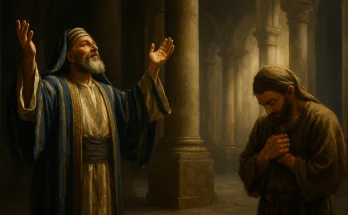Have you ever wondered what the parable of the wedding banquet reveals about God’s Kingdom and our place within it? This fascinating story, found in Matthew 22:1-14, takes us into the heart of Jesus’ teachings. He uses the imagery of a royal wedding feast to share deep truths about grace, invitation, and readiness.
In the Gospel of Matthew, this parable is part of a series of teachings directed at the religious leaders of the day. They were rejecting God’s message, and through this story, Jesus highlights the generosity of God’s invitation and the seriousness of rejecting it.
As we study this parable together, we’ll uncover how it reflects God’s incredible grace. We’ll also see the importance of responding to His call with genuine commitment. But there’s more—this story challenges us to prepare for the Kingdom of Heaven, symbolized by the wedding feast.
So, let’s dive in and explore what this parable teaches about our role in God’s Kingdom. Along the way, we’ll discover lessons that encourage us to embrace grace, live with purpose, and stay spiritually ready for the greatest celebration of all.
Setting the Scene: The Parable’s Context
What makes a wedding banquet such a powerful image for describing God’s Kingdom? The parable of the wedding banquet takes us into a scene rich with cultural meaning and spiritual depth. In biblical times, wedding feasts were grand, joyful occasions, often lasting several days. They symbolized celebration, unity, and the host’s generosity. A royal wedding, like the one described in this parable, would have been the ultimate event, an invitation no one would dare to ignore.
Jesus shared this parable during a tense moment with the Pharisees and chief priests, just days before His crucifixion. They were questioning His authority, yet through this story, He turned the tables, revealing their rejection of God’s invitation. The original guests in the parable, who dismissed or even scorned the king’s call, represent Israel’s leaders, who refused to accept Jesus as the Messiah.
But this parable goes beyond historical context. It shows us the heart of God’s Kingdom—a grand invitation to everyone. The banquet symbolizes the fullness of life with God, offered freely to all who accept. Even as some reject the call, the doors are flung wide open to others, reminding us of God’s amazing grace.
As we reflect on this context, we see that the parable isn’t just a story—it’s a challenge and an opportunity. God’s invitation is for us too, and understanding the cultural richness of the banquet helps us grasp the magnitude of His offer. How will we respond? The answer shapes not only our understanding of the parable but our relationship with God’s Kingdom.
The King’s Invitation: God’s Grace and Call
The parable of the wedding banquet opens with a generous invitation from the king to a royal celebration. This isn’t just any event—it’s a feast representing the Kingdom of Heaven. The king’s call is a beautiful picture of God’s grace, freely extended to all. Like the wedding banquet, God’s Kingdom offers joy, fulfillment, and relationship with Him. Yet, surprisingly, not everyone accepts this incredible invitation.
Rejection of the King’s Invitation
In the parable, the original guests refuse the king’s call. Some make light of it, while others respond with hostility. This rejection reflects the response of many in Israel, particularly its leaders, to Jesus’ message. Despite being God’s chosen people, they ignored His call, clinging instead to their own pursuits.
This part of the story reminds us of the human tendency to prioritize the temporary over the eternal. John 3:16 tells us that “God so loved the world that He gave His one and only Son,” yet not everyone chooses to believe and receive Him. The parable shows the heartbreak of such rejection, not because it diminishes God’s glory, but because it forfeits His blessings.
God’s Grace is Open to All
Thankfully, the king doesn’t stop with the first group of invitees. Instead, he sends his servants to invite anyone willing to come—rich or poor, good or bad, insiders or outsiders. This open invitation reflects the heart of God’s grace. Romans 10:13 proclaims, “Everyone who calls on the name of the Lord will be saved.”
This part of the parable is good news for us. It shows that God’s grace isn’t reserved for a select few. No matter our past, we are invited to the feast.
A Grace That Demands a Response
But here’s the key: the invitation alone isn’t enough. To enter the banquet, the guests must respond. Similarly, we must choose to accept God’s grace by turning to Him in faith and obedience. The parable challenges us to consider our own response to God’s invitation.
Will we, like the first guests, dismiss His call? Or will we embrace His grace and join the celebration? The answer shapes our destiny.
The Open Invitation: The Gentiles’ Inclusion
Have you ever wondered why the parable of the wedding banquet includes such an open invitation to unexpected guests? When the original invitees reject the king’s call, he commands his servants to go into the streets and invite everyone they find. This dramatic shift in the story is more than a plot twist—it’s a profound message about the inclusivity of God’s Kingdom.
In the culture of Jesus’ time, inviting people from the streets to a royal wedding would have been shocking. These were individuals who didn’t “belong” in the palace—those overlooked by society, the poor, and the outcasts. Yet, in the parable, the king’s generosity extends to all, reminding us that God’s grace knows no boundaries. This open invitation symbolizes the inclusion of Gentiles in God’s Kingdom, a theme woven throughout Jesus’ teachings.
We see a similar message in Luke 14:16-24, where another banquet story highlights God’s desire for a full table. Those who accept the invitation, regardless of their background or status, are welcomed with open arms. This teaches us that entry into God’s Kingdom isn’t about who we are but about our willingness to respond to His call.
The parable of the wedding banquet assures us that God values every individual, no matter their past or position. His Kingdom is a place where all are invited, but only those who say “yes” will join the celebration. This should fill us with hope and inspire us to share His invitation with others. Who in our lives needs to hear that God’s grace is for them too? The banquet is ready, and the doors are open—let’s not keep the good news to ourselves.
The Wedding Garment: Spiritual Readiness
Why would someone invited to a royal banquet fail to wear the proper attire? The parable of the wedding banquet introduces a guest who arrives without a wedding garment, and the consequences are severe. At first glance, this part of the story might seem harsh, but it carries a profound message about spiritual readiness and transformation.
A Symbol of Unpreparedness
In the parable, the guest without proper attire represents those who accept God’s invitation but fail to prepare their hearts. Attending a royal wedding without the right clothing was a grave insult to the host. Similarly, entering God’s Kingdom without genuine repentance or spiritual transformation is an affront to His grace. This unpreparedness isn’t about outward appearances but about an inner rejection of God’s call to holiness.
The Wedding Garment as Righteousness
Scripture often uses garments to symbolize righteousness. Isaiah 61:10 describes being clothed “with garments of salvation” and “a robe of righteousness.” Revelation 19:8 links fine linen, bright and clean, to “the righteous acts of God’s holy people.” The wedding garment in the parable of the wedding banquet reflects this idea. It’s not something we create ourselves but something given by God through faith in Christ.
When we respond to God’s invitation, we must put on the righteousness of Christ. This requires more than just showing up—it demands a willingness to let God transform us from the inside out.
Implications for Entering God’s Kingdom
The parable teaches that accepting God’s invitation comes with responsibilities. It’s not enough to say “yes” and go on living as we please. True acceptance requires repentance, faith, and a commitment to live according to God’s ways. This readiness isn’t about perfection but about surrendering to Christ and allowing Him to clothe us in His righteousness.
The guest without a wedding garment reminds us that God’s grace is free, but it’s not cheap. It calls us to prepare our hearts and align our lives with His will.
Practical Applications for Today
What does this mean for us? First, we must examine our own spiritual readiness. Are we living in alignment with God’s Word, or are we simply going through the motions? Second, we should ask God daily to clothe us in His righteousness. This might involve confessing sins, seeking forgiveness, or committing to grow in faith and obedience.
Finally, we must encourage others to prepare as well. Just as the wedding garment was essential in the parable, spiritual readiness is essential for entering God’s Kingdom. Are we helping others understand this truth and guiding them toward transformation?
The parable of the wedding banquet challenges us to go beyond accepting the invitation—it calls us to be ready for the feast. Let’s reflect on our lives, embrace Christ’s righteousness, and live prepared for His Kingdom. The banquet is ready. Are we?
“Many Are Called, Few Are Chosen”: Understanding the Conclusion
What does it mean that “many are called, but few are chosen”? This striking conclusion to the parable of the wedding banquet often leaves us wondering about its deeper significance. The phrase reminds us that God’s invitation to His Kingdom is extended to all, but not everyone will embrace it fully.
Being “called” represents the invitation—a display of God’s grace available to everyone. However, being “chosen” points to those who respond with faith and obedience. It’s not enough to merely hear God’s call; we must act on it, allowing our lives to be transformed by His righteousness. This distinction challenges us to examine whether we are truly living as disciples of Christ or just passively accepting His invitation.
This phrase also encourages us. It’s a call to live out our faith with intention and purpose. Romans 8:30 reminds us that those whom God calls, He also justifies and glorifies. By trusting Him and walking in obedience, we move from being called to being chosen.
The parable of the wedding banquet inspires us to take our faith seriously, ensuring we not only accept God’s invitation but also prepare our hearts for His Kingdom. Let’s live as those who are chosen, ready for the feast.
The New Strong’s Expanded Concordance
The best concordance for word study! This exclusive new edition of a legendary classic puts generations of biblical research at your fingertips.
Final Thoughts: Lessons for Today
How does the parable of the wedding banquet shape the way we live today? It reminds us of God’s incredible grace, freely inviting everyone to His Kingdom. Yet, this grace requires a response—we must accept the invitation and prepare our hearts through faith and obedience. Spiritual readiness is essential, as we never know when the feast will begin. Jesus challenges us to “seek first His Kingdom and His righteousness” (Matthew 6:33), urging us to live intentionally. Let’s embrace His call, clothe ourselves in His righteousness, and be ready to celebrate in His eternal Kingdom. Are we prepared to say yes?
Frequently Asked Questions (FAQ) About the Parable of the Wedding Banquet
1. What is the main message of the parable of the wedding banquet? The parable emphasizes God’s grace in inviting everyone to His Kingdom, the importance of responding to His call, and being spiritually prepared. It highlights that while many are called, only those who truly accept and prepare for His invitation will be chosen.
2. Why was the guest without a wedding garment cast out? The wedding garment symbolizes righteousness, which comes from faith in Christ. The guest’s lack of proper attire represents unpreparedness or rejection of transformation. This shows that entering God’s Kingdom requires more than just showing up—it demands repentance and a changed heart.
3. What does “many are called, but few are chosen” mean? This phrase reminds us that God’s invitation is extended to all, but only those who respond with faith and obedience are chosen. It challenges us to move beyond hearing His call to living as committed followers of Christ.





